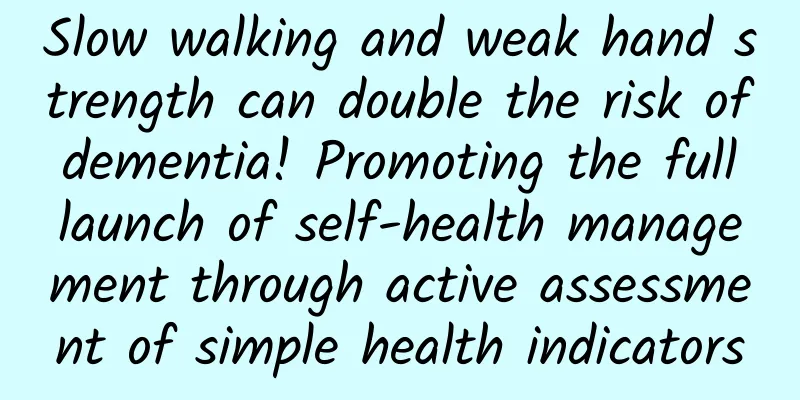Slow walking and weak hand strength can double the risk of dementia! Promoting the full launch of self-health management through active assessment of simple health indicators

|
Walking is the most common daily behavior and a simple and effective way of exercise, which is closely related to human health. Recently, Dr. He Panpan and others from Professor Qin Xianhui's team at the National Clinical Research Center for Kidney Diseases of Nanfang Hospital of Southern Medical University published a research paper in the biomedical journal Alzheimer's Research & Therapy, showing that faster walking speed is associated with a lower risk of dementia. The study included nearly 500,000 adult participants from the UK Biobank study with an average age of 56.5 years. Among them, 40,464 participants (8.2%) reported a slow walking speed, 261,751 participants (52.8%) reported a normal walking speed, and 193,485 participants (39.0%) reported a fast walking speed. After 12 years of follow-up, 3986 (0.8%) participants developed dementia. Compared with participants who reported a slower walking speed, participants with an average or faster walking speed had a significantly lower risk of new-onset total dementia by 39% and 41%, a lower risk of new-onset Alzheimer's disease by 36% and 36%, and a lower risk of new-onset vascular dementia by 46% and 53%, respectively. In addition, age and APOE ε4 genotype significantly modified this association, and this inverse association was significantly attenuated in participants who carried two APOE-ε4 genes or were older (Figure 1). Figure 1 The inverse association between gait speed and dementia risk is attenuated in people who carry two APOE-ε4 genes or are older At the same time, grip strength, as an important indicator of muscle health, is also significantly correlated with dementia risk; the stronger the grip, the lower the risk of dementia, and the two are significantly continuous and linearly negatively correlated. The results show that compared with people who walk slowly and have weak grip, people who maintain a faster walking speed and stronger grip have a significantly lower risk of dementia by 55%. The results of this study emphasize the importance of comprehensive assessment of physical function, genetic characteristics, and age to identify dementia risk and improve dementia risk stratification. Most importantly, the general population should actively pay attention to their own health status through the assessment of simple health indicators such as grip strength and walking speed, which will be the only way to promote their initiation of self-health management and achieve active health! References: He P, Zhou C, Ye Z, Liu M, Zhang Y, Wu Q, Zhang Y, Yang S, Xiaoqin G, Qin X. Walking pace, handgrip strength, age, APOE genotypes, and new-onset dementia: the UK Biobank prospective cohort study. Alzheimers Res Ther. 2023 Jan 9;15(1):9. doi: 10.1186/s13195-022-01158-6. PMID: 36624486; PMCID: PMC9827642. Editor | He Panpangan Xiaoqin Audit | Qin Xianhui Reprint: Please contact us and indicate the source. |
<<: Fighting monsters with asthmatic babies at home
Recommend
Is bloating a symptom of pregnancy?
Some people define these abdominal symptoms as pr...
Kidney disease can also cause high blood pressure, don’t believe it!
Author: Cai Jun, Chief Physician, Fuwai Hospital,...
How to reduce wrinkles around eyes
Wrinkles on the face are a common sign of aging, ...
The harm of eating leftovers for pregnant women
In daily life, leftovers are difficult to avoid, ...
Diarrhea-like pain in late pregnancy
During pregnancy, women are responsible for provi...
Can I get pregnant during my period?
It is said that women cannot have sex during mens...
Introduction to weight loss methods for middle-aged women
Losing weight for middle-aged women is a new tren...
What is the cause of bleeding after sex?
Physical conditions have a profound impact on you...
What are multiple cervical nabothian cysts?
Multiple nabothian cysts of the cervix are a comm...
What to do if there is a lump in the breast
Recently, many women have been troubled by this i...
At what age do girls usually develop breasts?
Many girls have poor breast development, which ma...
Can pregnant women drink Fanta?
Pregnant women must pay attention to their diet d...
Is it good to drink soup before meals? What kind of soup is better to drink before meals?
We all know that many people like to drink soup w...
When will the hot-blooded youth be broadcast? Where can I watch the specific update time of the hot-blooded youth?
Speaking of the TV series Hot-Blooded Youth starr...
Why do women have strange smells?
Recently, many female friends have developed odor...









